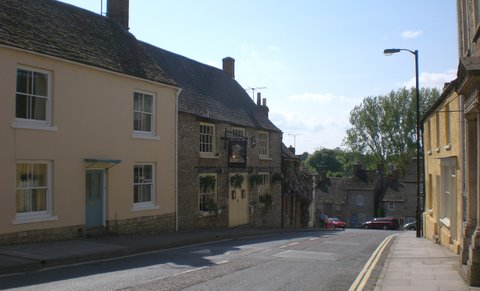According to the 16th-century writer, Leland: ‘The toun of Malmesbyri stondith on the very toppe of a greate slaty rok, and ys wonderfully defended by nature’. Certainly, the river Avon and a tributary almost completely surround the town, forming a perfectly natural defense system. In 925 AD, King Athelstan of Wessex (reigned 925 – 940), the grandson of Alfred the Great and who is buried in the abbey, made Malmesbury his capital. Since he may be thought of as the first king of all England, there are some grounds for considering the town as the first English capital, a designation usually reserved for Winchester. Athelstan was responsible for widening the national boundaries further than ever before. In 927 he took York from the Danes and gained the submission of King Constantine of Scotland. All five of the Welsh kings agreed to pay a huge annual tribute to him, and he also eliminated opposition in Cornwall. In 937, at the battle of Brunanburh, Athelstan led a force drawn from Britain and defeated an invasion by the king of Scotland in alliance with the Welsh and Danes. He extended a codified legal system across the country and regulated a coherent currency system. Areas of settlement were consolidated into shires.
In gratitude for the help given him by the townsfolk of Malmesbury in his victories, Athelstan gave them their freedom, and to the south of the town, presented them with six hundred hides of land (a hide being an ancient measurement of area with imprecise dimensions but originally meaning a patch of land big enough to support a family). The status of freemen or commoners of Malmesbury remains to this day but probably owes its existence to a title given to tradesmen and craftsmen coming into the town during the early Middle Ages. The claim of direct lineage from the men who fought with King Athelstan to the present-day commoners is unlikely, though possible. Nonetheless, since at least the 17th century, the right has been handed down from father to son or son-in-law. A maximum of two hundred and eighty commoners are permitted and to gain the coveted title one has to be born to a freeman or marry the daughter of one.
Since the year 2000, women have been admitted – the daughters of freemen. The freemen of Malmesbury still own the land to the south of the town, along with dozens of properties, pubs, and shops within the town itself, providing affordable housing to the townsfolk.
Notwithstanding its remarkable history, Malmesbury is a place frequently overlooked by visitors in favor of the more photogenic towns and villages that abound in the region. Yet, because of its geographical peculiarities, the Industrial Revolution passed the town by, which has resulted in a profusion of well-preserved ancient buildings – so the town is worth a detour.


0 Comments